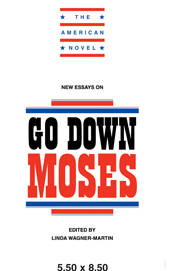Book contents
- Frontmatter
- Contents
- Series Editor's Preface
- 1 Introduction
- 2 Touching Race in Go Down, Moses
- 3 Go Down, Moses and the Discourse of Environmentalism
- 4 Her Shape, His Hand: The Spaces of African American Women in Go Down, Moses
- 5 Who Wears the Mask? Memory, Desire, and Race in Go Down, Moses
- 6 The Game of Courts: Go Down, Moses, Arbitrary Legalities, and Compensatory Boundaries
- Notes on Contributors
- Selected Bibliography
2 - Touching Race in Go Down, Moses
Published online by Cambridge University Press: 16 January 2010
- Frontmatter
- Contents
- Series Editor's Preface
- 1 Introduction
- 2 Touching Race in Go Down, Moses
- 3 Go Down, Moses and the Discourse of Environmentalism
- 4 Her Shape, His Hand: The Spaces of African American Women in Go Down, Moses
- 5 Who Wears the Mask? Memory, Desire, and Race in Go Down, Moses
- 6 The Game of Courts: Go Down, Moses, Arbitrary Legalities, and Compensatory Boundaries
- Notes on Contributors
- Selected Bibliography
Summary
OF all Faulkner's major works, Go Down, Moses remains the one most beset by anomaly and least certain of its place. Indisputably still the product of a master — emphatically so in the descriptions of the wilderness hunts — it nonetheless anticipates, particularly in Isaac McCaslin's convoluted defense of southern racial gradualism, Faulkner's long losing battles against the impotence of southern moderation on social issues, and against the garrulity that often overtakes his later style. Appearing six years after Faulkner had published perhaps the greatest of all American novels, Go Down, Moses searches out the contemporary consequences of what Absalom, Absalom! had already identified as the South's doom: That it was “now paying the price for having erected its economic edifice not on the rock of stern morality but on the shifting sands of opportunism and moral brigandage” (209). What does Ike's ascetic renunciation of social responsibility and his retreat to the big woods add to Quentin Compson's catatonic rehearsal of flawed design and his grief stricken plunge into oblivion?
What, too, are we to make of a work that presents itself as generically and formally unstable: a book not of short stories, as Faulkner insisted after the first edition's mistaken subtitle, but certainly not the unified novel he always claimed it to be? After the grand architecture of Absalom, the adroit short forms of The Unvanquished (1937), and the ingenious double plotting of The Wild Palms (1939), Go Down, Moses hesitates before a complexity that seems to overwhelm it.
- Type
- Chapter
- Information
- New Essays on Go Down, Moses , pp. 21 - 48Publisher: Cambridge University PressPrint publication year: 1996
- 13
- Cited by



